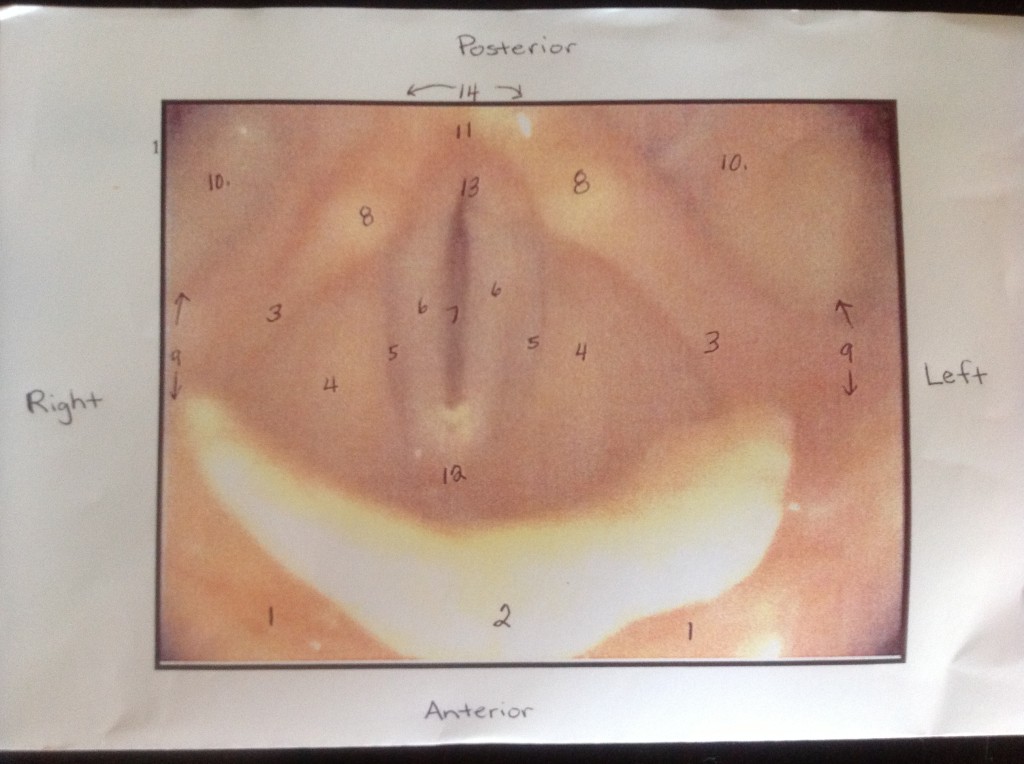DYSPHAGIA is defined as “difficulty swallowing” (Greek root dys meaning “difficulty” and phagia meaning “to eat”). Swallowing problems can be classified in three main phases: the oral phase (the mouth and area where chewing occurs), the pharyngeal phase (the throat at the back of the mouth behind the uvula and extending downward), and the esophageal phase (the tube that connects the throat to the stomach). The swallow mechanism’s purpose is to close off the trachea (wind pipe) and direct food, liquid, pills, and saliva to the esophagus (swallowing pipe). When a patient’s swallow muscles are not functioning properly, he/she can become at risk for other medical problems. One common, high risk complication arising from dysphagia is aspiration pneumonia, a type of pneumonia caused when solids, liquids, and/or saliva with bacteria enter the lungs (aspiration) and infection forms.
If a patient appears to be at risk for this type of aspiration (solids, liquids, and/or saliva entering the lungs), his/her physician may refer the patient to a Speech Language Pathologist (SLP) for a swallow evaluation. This profession may also be known as a Speech Therapist (ST). SLPs are only about 50-60% accurate in identifying aspiration at bedside or in the dining room, supporting the need for INSTRUMENTAL swallow evaluations to be able to visualize what is going on inside. This knowledge assists the SLP in diet/liquid recommendations and tailor treatment planing based on impairment to give patients the best chance at improvement. There are two main types of instrumental swallow evaluations: (1) a modified barium swallow study (MBSS), also known as a video fluoroscopic swallow study OR videoswallow and (2) a fiberoptic/flexible endoscopic evaluation of swallow (FEES). These two instrumental assessments identify whether the patient is aspirating material (food, drink, saliva, pills) into the larynx/trachea. These procedures also aim to trial various solid/liquid consistencies and strategies/techniques to see if swallowing can be made easier and safer for the patient. A Speech Language Pathologist (SLP) is the healthcare professional specialized in treating dysphagia (difficulty swallowing). Other pt care modalities an SLP treats include: voice, speech, language, and cognition.

- Valleculae
- Epiglottis
- Aryepiglottic Folds
- False Vocal Folds
- Ventricular Space
- True Vocal Folds
- Airway/Trachea
- Arytenoids
- Lateral Channels
- Pyriform Sinuses
- Interarytenoid Space
- Anterior Commisure
- Posterior Commisure
- Esophageal Opening
Dysphagia can be A RESULT of many medical diagnoses including, but not limited to:
- Progressive Neurological Disease – Parkinson’s Disease, Amyotrophic Lateral Sclerosis (ALS/Lou Gehrig’s), Multiple Sclerosis, Myasthenia Gravis, Muscular Dystrophy, Alzheimer’s Disease, etc.
- Traumatic Brain Injury (TBI) – Motor Vehicle Collision (MVC), fall, assault, etc.
- Head, Neck, and/or Esophageal Cancer – Rad/Chemo, Reconstructive Surgery, etc.
- Nervous System Infections – Meningitis, Tuberculosis, Encephalitis, etc.
- Cerebral Vascular Accident (CVA) – Stroke

- Spinal Cord Injury (SCI)
- Gastroesophageal Reflux Disease (GERD)
- Chronic Obstructive Pulmonary Disease (COPD)
- Respiratory Failure – Tracheostomy & Ventilator
- Deconditioning/Weakness from Lengthy Hospitalization
- Status Post Intubation from a Surgery
- Encephalopathy
- Aging Process
- Bell’s Palsy
- Guillian Barre Syndrome
- Cleft Lip and/or Palate
- The list goes on and on and on…
